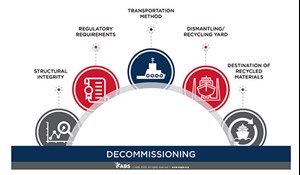Decommissioning: Practical considerations for the end of an asset
The scale and scope of decommissioning challenges and opportunities across industries is increasing at pace. In just 10 years, there has been a growth in global offshore decommissioning, which is further predicted to grow more in the next decade, with forecasted costs set to rapidly increase. The UK’s Energy Institute is one of many entities that predict a major uplift in decommissioning activity, as aging assets reach the end of their design lives and are retired from service.1

Regulatory, structural, environmental and transportation concerns are some of the key aspects of the decommissioning puzzle (Fig. 1), and the pressure is evident for owners and operators to ensure their decommissioning obligations are being met. Quantifying the scale and nature of the decommissioning challenge, however, is far from simple. ABS offers the following practical considerations to support a safe, efficient and smart decommissioning project.
STRUCTURAL INTEGRITY
As owners and operators embark on a decommissioning project, the structural integrity of the aging asset is an important consideration. Maintenance of the structure must continue, and the unit must retain sufficient fatigue life throughout the decommissioning phase—including transportation from site to recycling yard. Detailed analysis, considering the transit routes and loading conditions, must be made. The schedule should have provisions for potential structural repairs, reinforcements and also possible equipment removal, to adjust loading.
REGULATORY ASPECTS
Regulatory oversight of decommissioning projects is increasing, as well. Each country of origin will have unique obligations from multiple stakeholders (e.g., maritime authorities, petroleum regulators and environmental agencies). In addition, not only do project leaders need to consider the country of origin but also the ultimate country of destination and the countries along the sailing route. Finally, international conventions are also a consideration. Owners and operators must determine which multilateral agreements will apply (e.g., the Basel Convention that applies to the transportation of hazardous materials, or the Hong Kong Convention that focuses on the recycling of ships apply to the decommissioning project).
EMISSIONS
Emissions are a key sustainability factor to consider throughout the decommissioning process, from dismantling to transportation. Compliance with local, regional and international greenhouse gas emissions policies is part of the equation. ABS recommends an environmental impact assessment that presents the owner’s and operator’s responsibilities concerning the potential environmental impacts of all proposed programs of work.
This assessment gives an overview of possible effects over the course of decommissioning, taking into consideration the project and site-specific mitigation measures. Also, it estimates the possible cumulative effects of the operations offshore, in combination with other potential operations in the area.
DISMANTLING AND RECYCLING
Recycling materials from an aging asset is a well-established practice, yet owners and operators are facing requirements to confirm that the recycling facilities are legitimate and authorized to handle the materials. Certifications are often necessary for compliance with international conventions (e.g., the aforementioned Basel agreement). Permits from local authorities, along with agreements from recycling and disposition companies, are also often required. Sales agreements, handover conditions and overall recycling requirements are additional considerations needing attention from owners and operators, to ensure proper contractual terms and conditions are included.
Moreover, each decommissioning project can give rise to a wide range of waste. Both routine and decommissioning waste must be handled correctly to minimise impacts on the environment—above and below the water line. Failure to assess and characterise the waste properly may result in misclassification, and it could potentially be transported to a site not authorised or equipped to deal with it, which has potential to negatively impact the reputation and public image of the owner and operator.
THIRD PARTY VERIFICATION
Third-party expertise in regulatory requirements, certification and verification can help owners and operators better manage the process of decommissioning, by providing efficiencies in the decommissioning timeline and reducing project risks. An outside agency can support an owner with the required verification that processes were actioned correctly (e.g., the dismantling process, welding or cutting procedures and disposal of materials and waste, among others).
Utilizing a third party for support can provide procedures, assessments and quality audits, along with regular reports for key stakeholders, throughout the decommissioning project.
CONCLUSION
Rather than viewing the end point as a release from regulatory control, it is essential to create a shared vision for post-decommissioning, in which internal and external stakeholders have a common goal of safe, sustainable operations.
ABS highlights that significant effort must continue to be made across industries, to ensure that maximum efficiencies are realized above and below the water line, so that decommissioning risks are kept to a minimum and the processes are put in place to cover any long-term potential impact.
Irrespective of the asset type—whether offshore or onshore—a pragmatic approach is needed, and it is of paramount importance when devising the most appropriate approach to the economics and physical implementation of decommissioning an asset.
REFERENCE
- Executive viewpoint: Advancing offshore crane safety through collaboration (March 2025)
- What's new in exploration: Gulf of what? Mar del Norte ~1519? Gulf of North America? (March 2025)
- Decarbonizing Scope 3 emissions: The responsible approach to energy travel (February 2025)
- Advancing MPD operations with integrated riser joint technology (January 2025)
- Offshore Technology: Safer by technology (January 2025)
- Digitalizing training management and delivery (December 2024)
- Subsea technology- Corrosion monitoring: From failure to success (February 2024)
- Applying ultra-deep LWD resistivity technology successfully in a SAGD operation (May 2019)
- Adoption of wireless intelligent completions advances (May 2019)
- Majors double down as takeaway crunch eases (April 2019)
- What’s new in well logging and formation evaluation (April 2019)
- Qualification of a 20,000-psi subsea BOP: A collaborative approach (February 2019)


